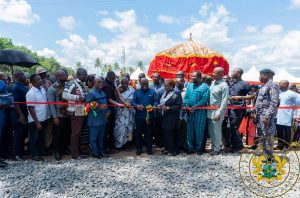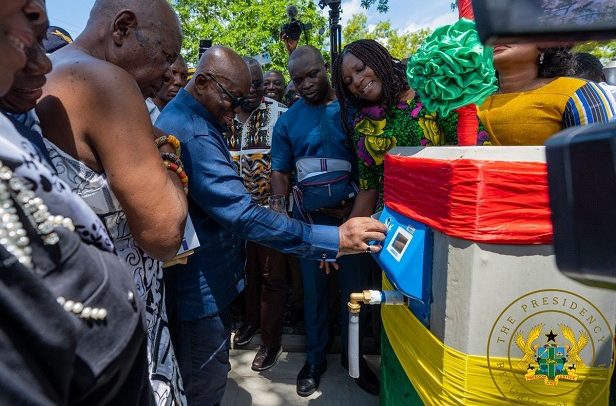President Nana Addo Dankwa Akufo-Addo marked a significant milestone on Monday as he commissioned Phase Three of the Five Districts Water Supply Project at Adaklu in the Volta Region.
This project, for which he initiated the groundbreaking ceremony in September 2020, is aimed at providing reliable access to clean water for the region’s communities.
The Five Districts Water Supply Project was financed by a concessionary facility worth €11.5 million, secured from Raiffeisen Bank International AG of Austria.

The project is expected to benefit a staggering population of 89,150 individuals residing in 95 communities across Central Tongu, Adaklu, and Agotime-Ziope.
The newly commissioned Phase Three represents a significant step forward in fulfilling the project’s objectives. It will further enhance the availability of clean water for thousands of people who have long faced water scarcity challenges in the region. With the completion of this phase, the remaining districts are closer to experiencing the benefits of this essential infrastructure project.
It is worth noting that the Five Districts Water Supply Project serves as a vital component of the government’s commitment to improving the lives of Ghanaians by ensuring access to clean water and sanitation facilities. The provision of clean water is crucial for supporting personal hygiene, preventing waterborne diseases, and fostering economic development in these communities.

During the inauguration ceremony at Adaklu, President Akufo-Addo mentioned that some of the key components of the Project are the construction of three concrete tanks at Adaklu Kpeleho, Adaklu Sofa and Adaklu Kpatove, to help keep the water safe from any bacteria; the completion of a water booster station at Adaklu Kpeleho to transport water to Adaklu and Agotime-Ziope communities; and the laying of one hundred and seventy-five (175) kilometres of water pipelines.
With designs for Phase IV of the Project are ongoing, the President told the gathering that the focus of Government is to ensure that all Regions across the country are provided with adequate, safe, affordable and reliable water services.
“We are also committed to ensuring that we practice safe sanitation and hygiene by the year 2030, in line with the attainment of the 2030 United Nations Sustainable Development Goals (SDGs). Our strategic goal is to use a multi-faceted approach, with emphasis on governance and sector institutional strengthening, to accelerate access to equitable WASH services throughout Ghana,” he said.
Towards the goal of providing clean water and sanitation for all, President Akufo-Addo noted that his government has made significant progress towards this.
He cited the commissioning, in September 2020, of completed projects under the Water Supply Improvement Project of the Ghana-Spain Debt Swap Development, implemented by the Community Water and Sanitation Agency (CWSA), at a total cost of US$3.78 million, for a beneficiary population of 75,000.
“That Project seeks to expand access to and ensure sustainable services in thirty-six (36) rural and small towns/communities in the Ho, Ho West, Agotime-Ziope and South Dayi Districts. Outstanding works are expected to be completed by March next year,” he said.
President Akufo-Addo continied, “Again, on 30th June, 2020, I also commissioned Cluster Water Systems at Bontrase and Amasamkrom in the Central Region, as part of the Sustainable Rural Water and Sanitation Project (SRWSP). These commissioning ceremonies were done to symbolise the completion of similar water systems implemented in 11 out of the16 regions of the country, and it was financed from a US$47.5 million credit facility from the International Development Association (IDA) of the World Bank.”
The other beneficiary Regions, he stressed, were Ahafo, Bono, Bono East, Western, Western North, Northern, North East, Savannah, Upper West and Upper East.
The Project components, according the president, included the construction of piped water supply systems, support for construction of household latrines, health and hygiene education and environmental and social safeguards for 164 beneficiary communities, with a total population size of 154,826.
He expressed his satisfaction with the project’s progress and highlighted the government’s dedication to fulfilling its promises towards water infrastructure development.
He stated, “Access to safe and clean water is a basic necessity, and it is our duty as a government to ensure that every Ghanaian has access to this fundamental resource.”
Furthermore, the President emphasized the government’s commitment to tackling water challenges across the country, stating that similar initiatives would be launched in other regions to address water shortages and improve overall water accessibility.
The successful implementation of the Five Districts Water Supply Project would not have been possible without the collaborative efforts of various stakeholders, including the communities, development partners, and the Raiffeisen Bank International AG of Austria.
As the completion of Phase Three sets a precedent for the entire project, the government remains committed to investing in sustainable water infrastructure to safeguard the well-being and prosperity of Ghanaian citizens.
The inauguration of Phase Three of the Five Districts Water Supply Project in the Volta Region symbolizes a significant achievement in addressing water scarcity challenges faced by communities. The project’s successful implementation highlights the government’s dedication to improving the quality of life for Ghanaians by ensuring reliable access to clean water.
Under the Rural Communities and Small Towns Water Supply Project (RCSTWSP), Government is improving access to sustainable water delivery within the Volta, Oti, Greater Accra, Ashanti and Eastern Regions to benefit a total population of some two hundred and eighty-two thousand (282,000), at thirty million euros (€30 million). The Project is ongoing, and some seventeen percent (17%) complete.
Urban Communities – “Water for All”
Touching on the “Water for All” Agenda in urban communities, President stated that the Keta Water Supply Project, being implemented by the Ministry of Sanitation and Water Resources through the Ghana Water Company Limited, would also improve the reliability and sustainability of water supply to a beneficiary population of some 422,160 in Keta and surrounding communities, at an estimated cost of €85,112,854.
Works under this Project, he indicated, are expected to be completed by December 2024.
Additionally, the Wenchi Water Project, being constructed at a cost of €39 million involves the construction of a new water treatment facility, and the rehabilitation of the existing ground water system to meet current and future water requirements of the community until 2045.
“The Project is expected to serve some 101,870 people living within Wenchi and its environs,” he said
On the Sekondi-Takoradi Water Supply Project, which would cost some €70 million, and which would serve a beneficiary population of some 1.4 million within Sekondi-Takoradi communities, President Akufo-Addo stated that the project is expected to be completed by September 2025.
“The feasibility studies for the proposed Sogakope-Lome Transboundary Water Supply Project are ninety-eight percent (98%) complete, and funding would be sought to achieve sustainable improvement to access to drinking water for four million consumers in the Project area. In Ghana, the Project beneficiaries will include the Southern Volta area, more specifically the Municipal/Districts of Keta, Ketu South, Ketu North, South Tongu and Akatsi South,” he added.
By Vincent Kubi


